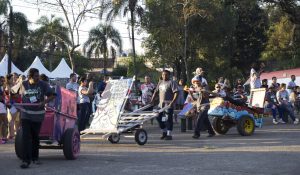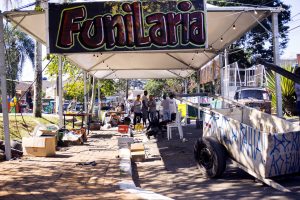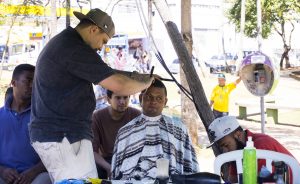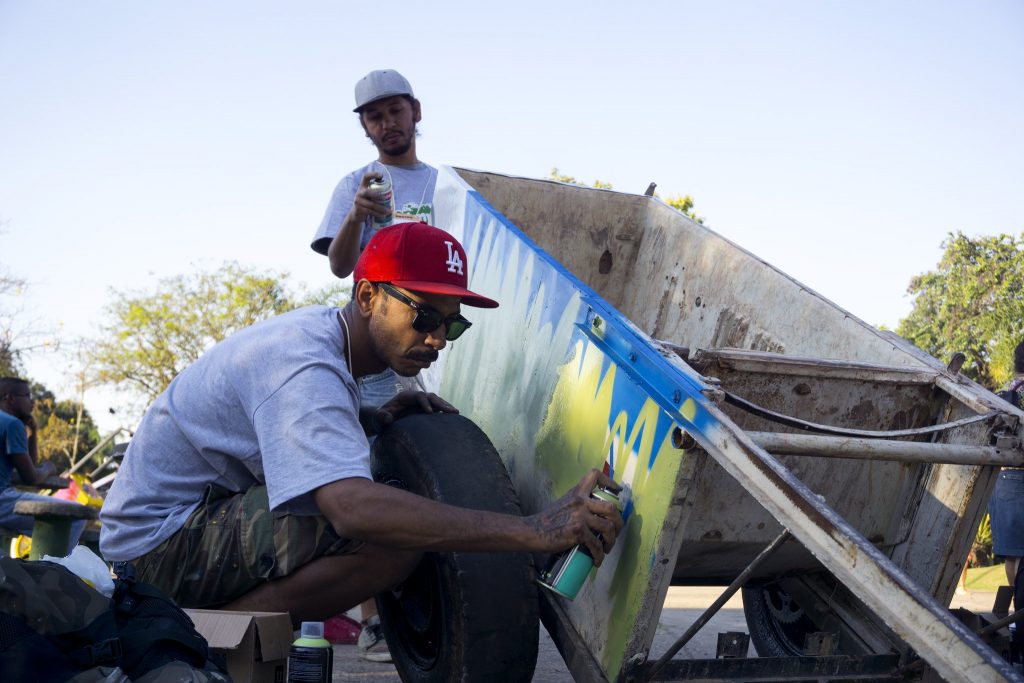São Paulo – Brazilian non-governmental organization (NGO) Pimp My Carroça upgrades and paints up the handcarts of recyclable waste pickers. Its work has been replicated in Morocco, the Arab country in North Africa. A staple of the NGO’s work is a collaborative day that sees handcarts upgraded and stamped with artwork by volunteers and artists. The same happened in Morocco’s Casablanca and Meknès on two occasions, in 2016 and 2017.

Pimp My Carroça Innovation and Partnerships manager Elissa Fichtler reveals that the project was brought to Morocco by the local language teacher Sonia Cooker, who watched a lecture by Pimp My Carroça founder Mundano and decided to do the same in her country. Sonia got help from her students.
“She said it was hard, because the pickers couldn’t understand why someone would help them. They were really distrustful during the process,” Elissa told ANBA via email. Nevertheless, she said the work was very important, and that one of the revamped handcarts has since become famous as a symbol of Casablanca. The following year, Sonia did another edition in Meknès. She would like to do more, but is having trouble finding the funds, according to Elissa.
The NGO’s work has been replicated in many countries other than Morocco before. “Since our first edition, we got a lot of spontaneous press. People in other cities and countries got in touch so they could do the same in their areas,” says Elissa. Since engaging society is one of the cornerstones of the organization, Pimp My Carroça shares its knowledge and provides full support to its replicators.

Pimp My Carroça is the brainchild of São Paulo-based artist and activist Mundano, who found that pickers’ handcarts were the ideal medium for his protest art. Elissa explains that the goal in slapping sayings like “Don’t honk your horn, just say hi” onto the carts was to fight prejudice and shine a light on the human beings who spend their days picking up trash and pulling a vehicle with their bare hands. “Not to mention that pickers would be prouder about their work with their carts covered in graffiti,” says Elissa.
Before the program even had a name, the first pimped-up carts started going around the city. The work grew in size and impact, and then Pimp My Carroça came into being in 2012. A major collaborative event was held that same year in São Paulo’s Anhangabaú Valley. Handcarts were refurbished and got paint jobs, and waste pickers got medical attention, citizenship and wellbeing services, and plenty of cultural activities. In 2016, another NGO – Movimento de Pimpadores, or the Pimpers’ Movement – was created to enhance the work and the fundraising.
Pimp My Carroça has headquarters in São Paulo and Recife, plus two standalone units in Cali and Bogota, Colombia. The NGO relies on a 13-strong hired staff, a network of 2,500 volunteers, and over 1,100 artists, and the support of companies, city halls, individual donors, and organizations. All its actions are designed to bring recognition and a fair pay to recyclable waste pickers, using art and societal engagement as tools.

Activities come in various formats. There’s a major eponymous event; a mini edition called Pimpex – which caters to four pickers; there’s Pimp Our Cooperative, which upgrades recyclers’ cooperatives; Pimp Challenge – so people can experience what being a picker is like; and Artivist Actions, featuring urban art interventions to spark reflection and optimize the pickers’ work.
A mobile app called Cataki was also created, to connect pickers and people with need to dispose of recyclables. The app features 4,500 pickers in over 500 Brazilian cities, and was named the World’s Best Technological Innovation Project by Netexplo, a digital innovation prize. It also won People’s Choice at the Chivas Venture 2019, an award for technological initiatives with a socioenvironmental impact.
And the NGO has plans for further expansion. New features will be added to the Cataki app next year. Also slated for 2020 is an ambassadors’ program and the final prototype for an electric-powered handcart, with backing from the Institute for Climate and Society (ICS) and the Institute for Technological Research (IPT). “The big challenge will be to develop [an electric handcart] that every picker can get access to, and maybe even buy it through their recycling work,” says Elissa.
Quick facts
Pimp My Carroça
Phone: +55 11 3034 2375
Site – Facebook – Instagram
Translated by Gabriel Pomerancblum




